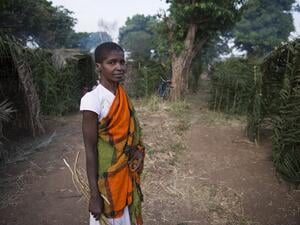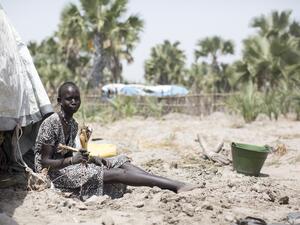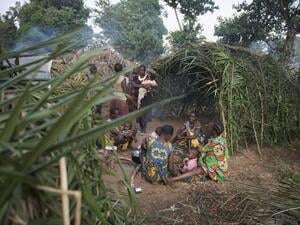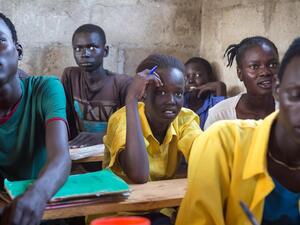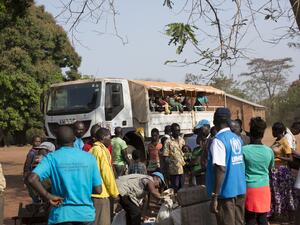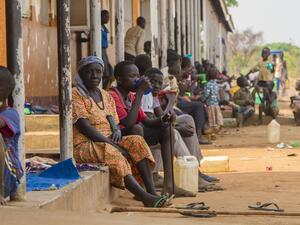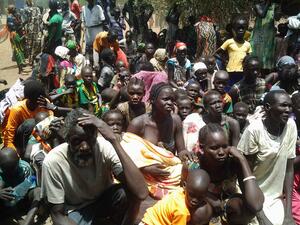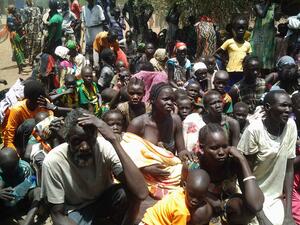South Sudan: UNHCR rescues refugee trapped by civil unrest
South Sudan: UNHCR rescues refugee trapped by civil unrest
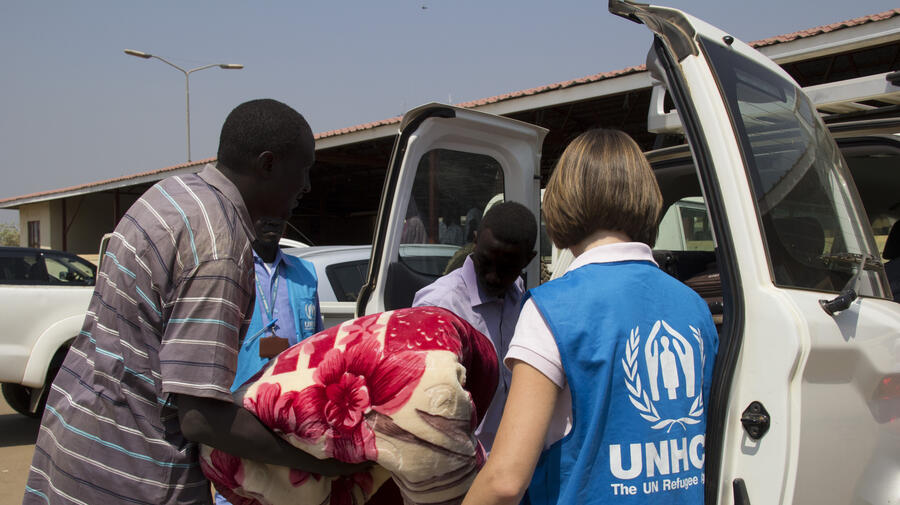
Yousif and his friend, Nagmadeen, both refugees from Darfur, load their modest possessions into a UNHCR car on arrival at the Juba airport. They are recognized refugees in Uganda who travelled on their own to Bentiu, South Sudan, and then got trapped by fighting there.
JUBA, South Sudan, January 9 (UNHCR) - Not many people would be overjoyed to land in Juba these days, with the streets bristling with tanks, soldiers and machine guns on the back of military pick-up trucks.
But relief is written all over the face of Yousif, a refugee from Sudan's Darfur region, as he gets off a UN flight at the Juba airport. Tension visibly drains away the moment he shakes hands with a young UNHCR protection officer who has rescued him from the volatile northern town of Bentiu, where he was trapped by fighting for more than two weeks. "It's great to finally be here," he says. "I'm just glad to be alive."
Yousif, a registered refugee in Uganda, went to Bentiu in November to comfort his sister, whose husband and two children had died in a traffic accident. He had the bad fortune to still be there a month later in mid-December when South Sudan descended into political and inter-ethnic violence.
Government troops lost control of oil-rich Bentiu, capital of Unity state, to opposition forces in mid-December, but hope to soon recapture it. During the battle for control of the city, Yousif, a lawyer, recalls a night of terror spent huddled under a bed in the home of a shopkeeper related to a Darfuri friend of his in Uganda. From 8 p.m. until 4 a.m., he says, gunfire rained down onto the homes of shopkeepers, who were special targets because of their money and goods.
When he, his friends and relatives emerged in the morning, their only thought was to make it past the bodies in the road to safety inside the base of UN peace-keepers, known here as UNMISS (UN Mission in South Sudan).
Once inside the UN compound, Yousif and his friend, Nagmadeen, said they were terrified to step outside. "The whole time I was inside, I never even dared to approach the gate, so I never could imagine I would get to Juba or Kampala," says Yousif. "I thought I would die there."
But rescue was waiting in the form of a United Nations advisor on protection of civilians, Kirsten Young. After four or five days in the Bentiu compound, Yousif and Nagmadeen noticed Young gathering Kenyan, Ethiopian and Ugandan citizens and other foreigners for evacuation, and approached her.
"I told her I am also from Uganda, but a refugee from Darfur and I want to go back to Uganda," Yousif says in very precise English. "I am so grateful to her. All thanks to Kirsten. I will always praise her. She saved my life."
Young contacted UNHCR in Juba, and Kasia Kot-Majewska, a protection officer whose job is to ensure that refugees' legal rights are respected, managed to verify his story within a matter of hours. "We knew his life was in danger," she says.
But for several days, the two men had a nail-biting wait for a seat on a UN flight out of Bentiu. When they finally left the UN compound, they were convinced they would not even survive the four-kilometre drive to the airport, such is the level of fear in South Sudan. At the airport, UN troops shielded them until they got onto the plane.
Yousif says his terror is rooted in what he experienced in Darfur, the war-torn western region of Sudan. "I have lost so much in my life. I have lost my brothers and sisters," he says. He even had to leave his pregnant wife in a camp for displaced people in Darfur and has never seen their only daughter, born soon after he fled to Uganda in 2011. His wife named her Walaa, which means "loyalty" in Arabic.
For Kot-Majewska, who worked as a humanitarian officer in Poland's Foreign Ministry before being posted to Juba for UNHCR, helping refugees like Yousif and Nagmadeen is the reason she joined the refugee agency. "I always wanted to work with refugees," she says. "You feel like you are doing the best work in the world."
When the two refugees finally landed in Juba, she says, "I was so happy. It's not in every job that you get to hear 'thank you'."
Young, who initiated their rescue, also finds a high pay-off. "In the past two weeks," she says, "our team has managed to facilitate the evacuation of almost 2,000 people. It is very rewarding to see people get on the flights, and to really be able to help people as we are meant to."
For Yousif and Nagmadeen, the journey is not yet finished, but they are confident they can make their own way back to Kampala, where they are both studying English so they can refresh their professional qualifications.
"When I was growing up, I never imagined I would encounter things like this," says Yousif. "But I think this is my destiny. Just now I am alone, without my family, without a mother or father, without even my wife. I hope peace will come to Darfur so that we can go back to our homes."
By Kitty McKinsey in Juba, South Sudan

